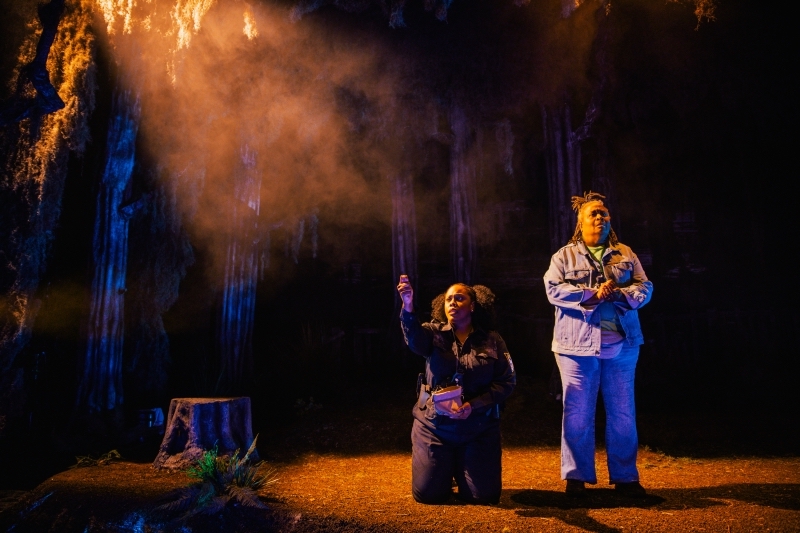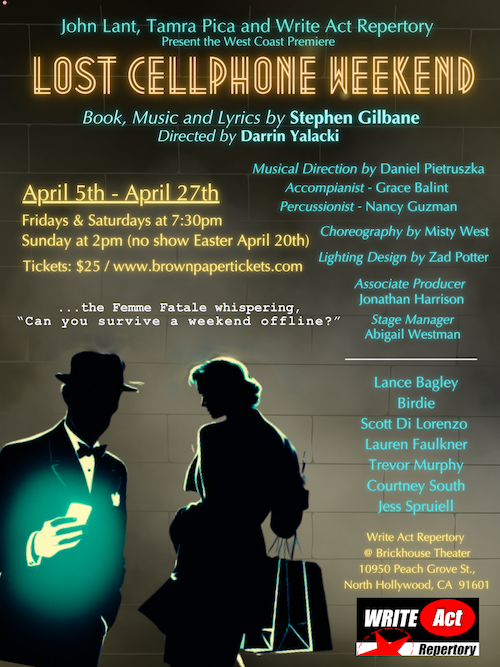
Amber Chardae Robinson and Kimberly Scott (Photo by Jeff Lorch)
Reviewed by Martίn Hernández
Geffen Playhouse
Through March 17
RECOMMENDED
It is August 2020 in East Texas, and the Covid-19 pandemic is in full effect. If the virus does not get you, the humidity, the mosquitoes, and the layoffs from the just-closed meat processing plant just might. When “Old Man” Rutherford, the area’s biggest employer and the richest and meanest White man in town, turns up dead, his grisly demise unearths long-held secrets of the Manifold family, descendants of enslaved people long at odds with the deceased and his ancestors. Balancing the horrific with the hilarious, playwright Kristen Adele Calhoun’s taut work examines the effects of generations of racism against Black folk, along with the steadfast skills they developed to cope with the subsequent trauma.
After Emancipation and the Civil War, the U.S. government granted land to formerly enslaved families like the Manifolds, only to have it stolen through intimidation, beatings, and lynchings by the ancestors of Rutherford and his ilk. “We is still here,” is matriarch Vernita Manifold’s (Kimberly Scott) defiant declaration to her oldest daughter LadyBird (Brandee Evans) as she relates how their forebearers defended their property from those violent efforts.
Vernita has summoned LadyBird and her sister RaeMeka (Angela Lewis) for an impromptu night fishing session. However, when the perennially tardy RaeMeka finally arrives, Vernita reveals her true reasons for her summoning them: She fears that, given they’ve all lost jobs at the firm and she’s had beef with the “trifling ass peckerwood,” suspicion may well fall on her. appearance of Taysha (Amber Chardae Robinson), an enigmatic intruder, adds to an already tense situation as each woman reveals her own contacts with Rutherford the night of his death.
As Ladybird — fanatically masked, gloved and sporting hand-sanitizer, Evans epitomizes the older, responsible daughter, whose obsession with social distancing may be about more than her health concerns for her partner and child. Lewis augments the play’s comic elements as the younger RaeMeka, whose side hustle adds an increased uncertainty to her already reckless life. As Vernita, an imperfect mother concealing a tragic past., Scott bounces between absurdity and seriousness. Robinson’s Taysha, who is the fly — or mosquito — in the ointment, emerges as a vulnerable interloper who holds the key to the Manifolds’ skeleton closet.
Director Tiffany Nichole Greene deftly maneuvers her actors on Lawrence E. Moten III’s expansive backwoods set, utilizing its tall cypress trees for her actors to hide behind — or even hug — and even employing pools of water for LadyBird’s fishing pole. At key moments, Greene has the trio of Manifolds and the solitary Taysha on opposite sides of the sloping moss-covered set — and then alternates, with the younger women together and Vernita alone, reflecting their shifting power dynamics. Donny Jackson’s dreamlike lighting and Everett Elton Bradman’s eerie sound and music add to Vernita’s mystical belief that Rutherford’s passing was retribution exacted by one of her family’s ancestral spirits
While Calhoun offers a biting critique of the racial prejudice — the play takes place is a mere three months after the police murder of George Floyd — a more systemic analysis could have added a tougher bite. Nevertheless, the play presents credible characters whose challenges to racial hostility set a mighty example worthy of celebration.
Geffen Playhouse, 10866 Le Conte Ave., Westwood. Wed.- Sat., 8 pm, Sat., 3 pm, Sun., 2 pm & 7 pm; thru March 17. www.geffenplayhouse.org Running time: 90 minutes with no intermission.












